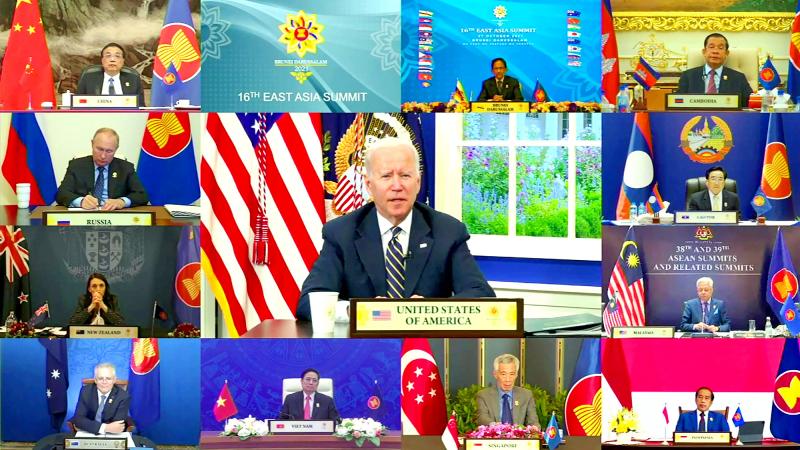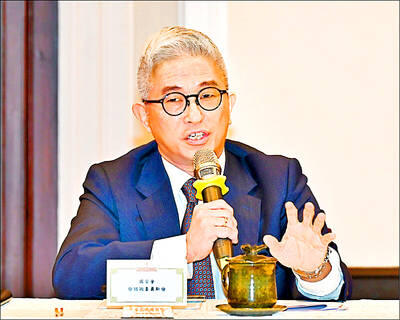US President Joe Biden on Wednesday criticized Beijing’s “coercive” actions across the Taiwan Strait in an address to a summit of Asia-Pacific nations.
Speaking via videoconference to the East Asia Summit, Biden said that the US was “deeply concerned by China’s coercive and proactive actions ... across the Taiwan Strait.”
Such actions “threaten regional peace and stability,” he said, according to a recording of his remarks obtained by reporters.

Photo: EPA-EFE
Biden was speaking at the summit, which brings together 18 Asia-Pacific nations — although the leaders met virtually this year due to the COVID-19 pandemic.
Chinese Premier Li Keqiang (李克強) was attending, along with Russian President Vladimir Putin and leaders of South Korea and Japan.
Biden also took aim at China’s maritime claims, saying that Washington was “fully committed to the freedom of the seas, open waterways and unimpeded flow of commerce, including in the South China Sea.”
He also said that the US would “speak out for human rights in Xinjiang and in Tibet, and the rights of the people of Hong Kong.”

A car bomb killed a senior Russian general in southern Moscow yesterday morning, the latest high-profile army figure to be blown up in a blast that came just hours after Russian and Ukrainian delegates held separate talks in Miami on a plan to end the war. Kyiv has not commented on the incident, but Russian investigators said they were probing whether the blast was “linked” to “Ukrainian special forces.” The attack was similar to other assassinations of generals and pro-war figures that have either been claimed, or are widely believed to have been orchestrated, by Ukraine. Russian Lieutenant General Fanil Sarvarov, 56, head

SAFETY FIRST: Double the number of police were deployed at the Taipei Marathon, while other cities released plans to bolster public event safety Authorities across Taiwan have stepped up security measures ahead of Christmas and New Year events, following a knife and smoke bomb attack in Taipei on Friday that left four people dead and 11 injured. In a bid to prevent potential copycat incidents, police deployments have been expanded for large gatherings, transport hubs, and other crowded public spaces, according to official statements from police and city authorities. Taipei Mayor Chiang Wan-an (蔣萬安) said the city has “comprehensively raised security readiness” in crowded areas, increased police deployments with armed officers, and intensified patrols during weekends and nighttime hours. For large-scale events, security checkpoints and explosives

‘POLITICAL GAME’: DPP lawmakers said the motion would not meet the legislative threshold needed, and accused the KMT and the TPP of trivializing the Constitution The Legislative Yuan yesterday approved a motion to initiate impeachment proceedings against President William Lai (賴清德), saying he had undermined Taiwan’s constitutional order and democracy. The motion was approved 61-50 by lawmakers from the main opposition Chinese Nationalist Party (KMT) and the smaller Taiwan People’s Party (TPP), who together hold a legislative majority. Under the motion, a roll call vote for impeachment would be held on May 19 next year, after various hearings are held and Lai is given the chance to defend himself. The move came after Lai on Monday last week did not promulgate an amendment passed by the legislature that

PENTAGON ASSESSMENT: A US report said that even as China and Russia deepen their partnership, cooperation is hindered by a ‘mutual distrust’ of each other The Chinese People’s Liberation Army (PLA) as of October had doubled the number of ships and airplanes deployed around Taiwan compared with the previous two years, Vice Minister of National Defense Hsu Szu-chien (徐斯儉) said yesterday, a day after the opposition-controlled legislature voted against reviewing the government’s general budget for next year, including a NT$1.25 trillion (US$39.71 billion) special defense spending bill. The legislature’s vote against the Ministry of National Defense’s spending plans was regrettable, as the budget was designed to respond to the developing Chinese military threat, Hsu said on the sidelines of a legislative meeting on the general budget. Defense